The optical density of turpentine is higher than that of water, while its mass density is lower. Fig. shows a layer of turpentine floating over water in a container. For which one of the four rays incident on turpentine in Fig., the path shows is correct ?
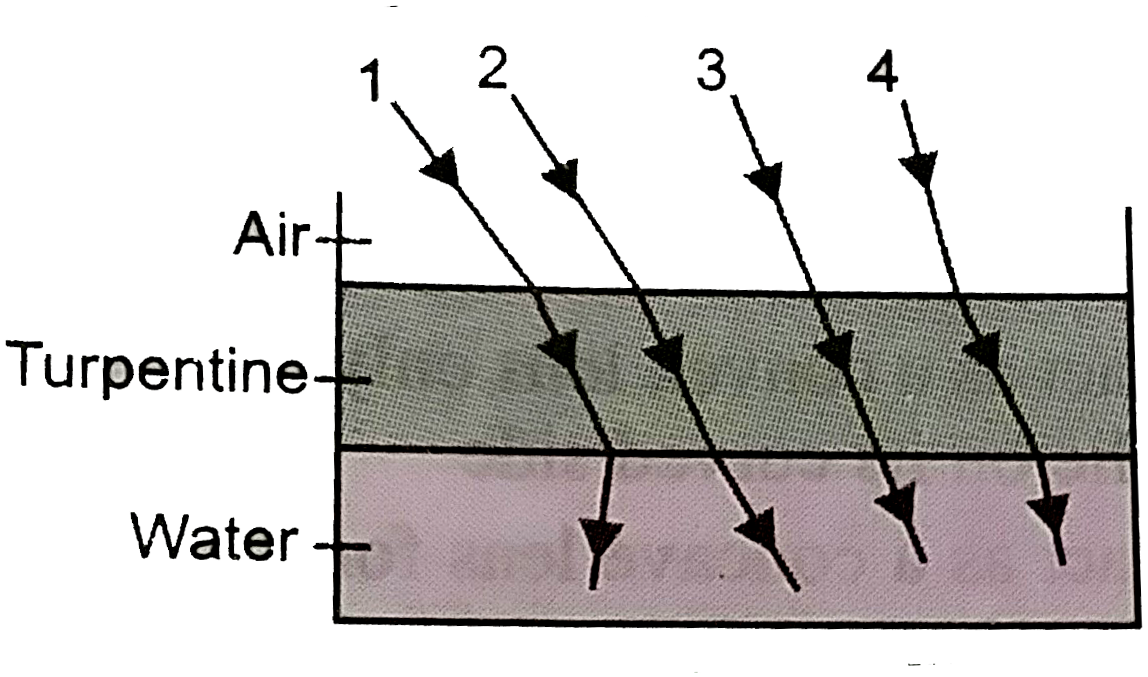 .
.
1
2
3
4
The correct Answer is:B
(b) Here light rays goes from (optically) rarer medium air to optically denser turpentine, then it bends towards the normal i.e., i>r whereas when it goes from to optically denser medium turpentine to rarer medium water, then it bends away the normal i.e., i>r.
Topper's Solved these Questions
- RAY OPTICSBOOK - DC PANDEY ENGLISHCHAPTER - RAY OPTICSEXERCISE - medical entrance special format question
23 Videos
- RAY OPTICSBOOK - DC PANDEY ENGLISHCHAPTER - RAY OPTICSEXERCISE - Medical entrance gallary
76 Videos
- RAY OPTICSBOOK - DC PANDEY ENGLISHCHAPTER - RAY OPTICSEXERCISE - Checkpoint 9.7
10 Videos
- NUCLEIBOOK - DC PANDEY ENGLISHCHAPTER - NUCLEIEXERCISE - C MADICAL ENTRANCES GALLERY
46 Videos
- REFLECTION OF LIGHTBOOK - DC PANDEY ENGLISHCHAPTER - REFLECTION OF LIGHTEXERCISE - Subjective
9 Videos
Similar Questions
The Fig. shows a glass tumbler containing hot milk which is placed in a tub of cold water. State the direction in which heat will flow.
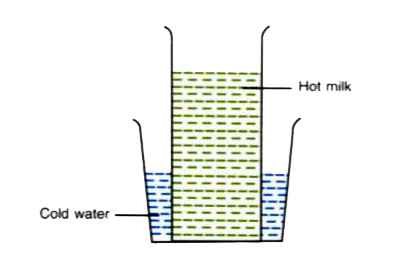
View SolutionA circus wishes to develop a new clown act. Fig. (1) shows a diagram of the proposed setup. A clown will be shot out of a cannot with velocity v0 at a trajectory that makes an angle θ=45∘ with the ground. At this angile, the clown will travell a maximum horizontal distance. The cannot will accelerate the clown by applying a constant force of 10,000N over a very short time of 0.24s. The height above the ground at which the clown begins his trajectory is 10m.
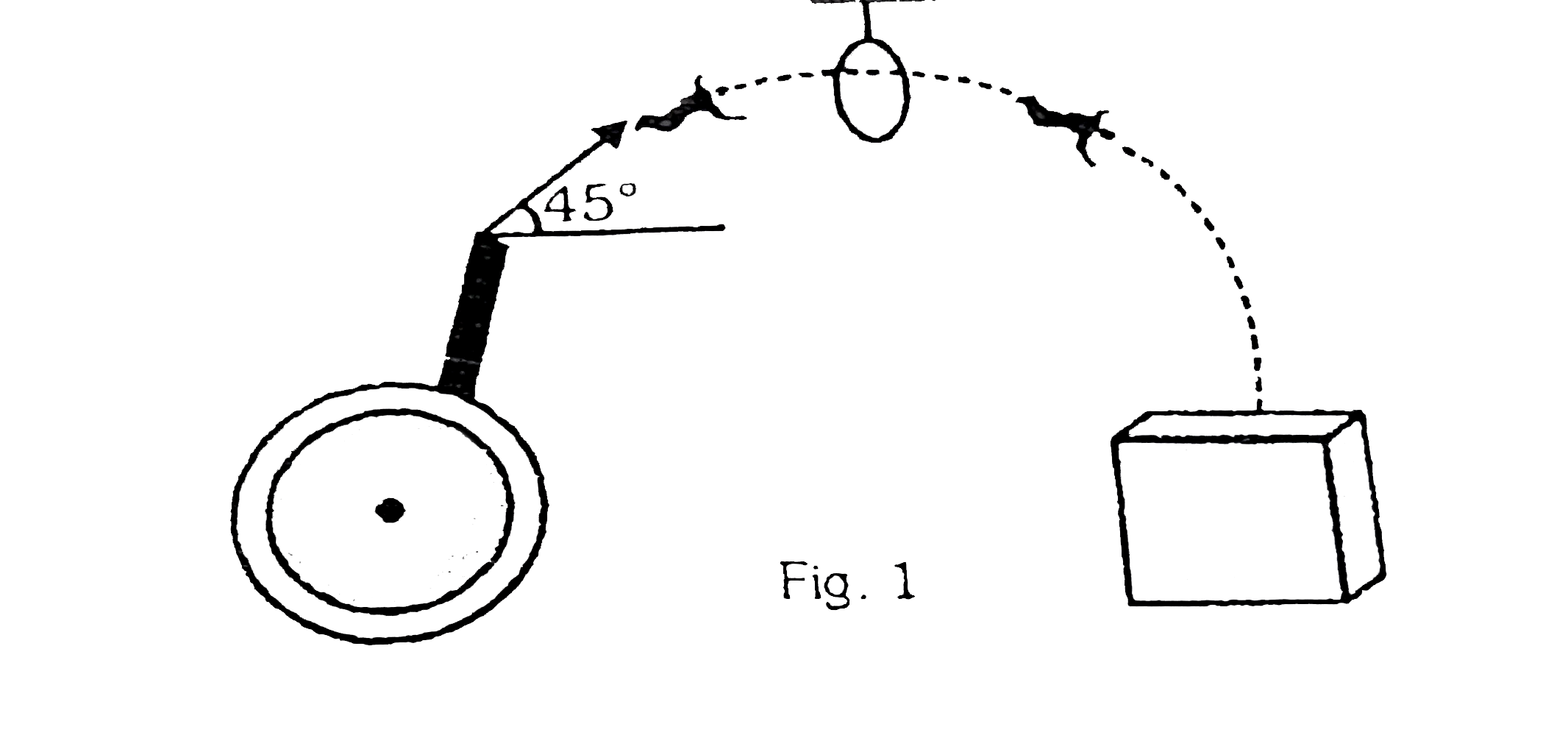
A large hoop is to be suspended from the celling by a massless cable at just the right place so that the clown will be able to dive through it when he reaches a maximum height above the ground. After passing through the hoop he will then continue on his trajectory until arriving at the safety net. Fig (2) shows a graph of the vertical component of the clown's velocity as a function of time between the cannon and the hoop. Since the velocity depends on the mass of the particular clown performing the act, the graph shows data for serveral different masses.
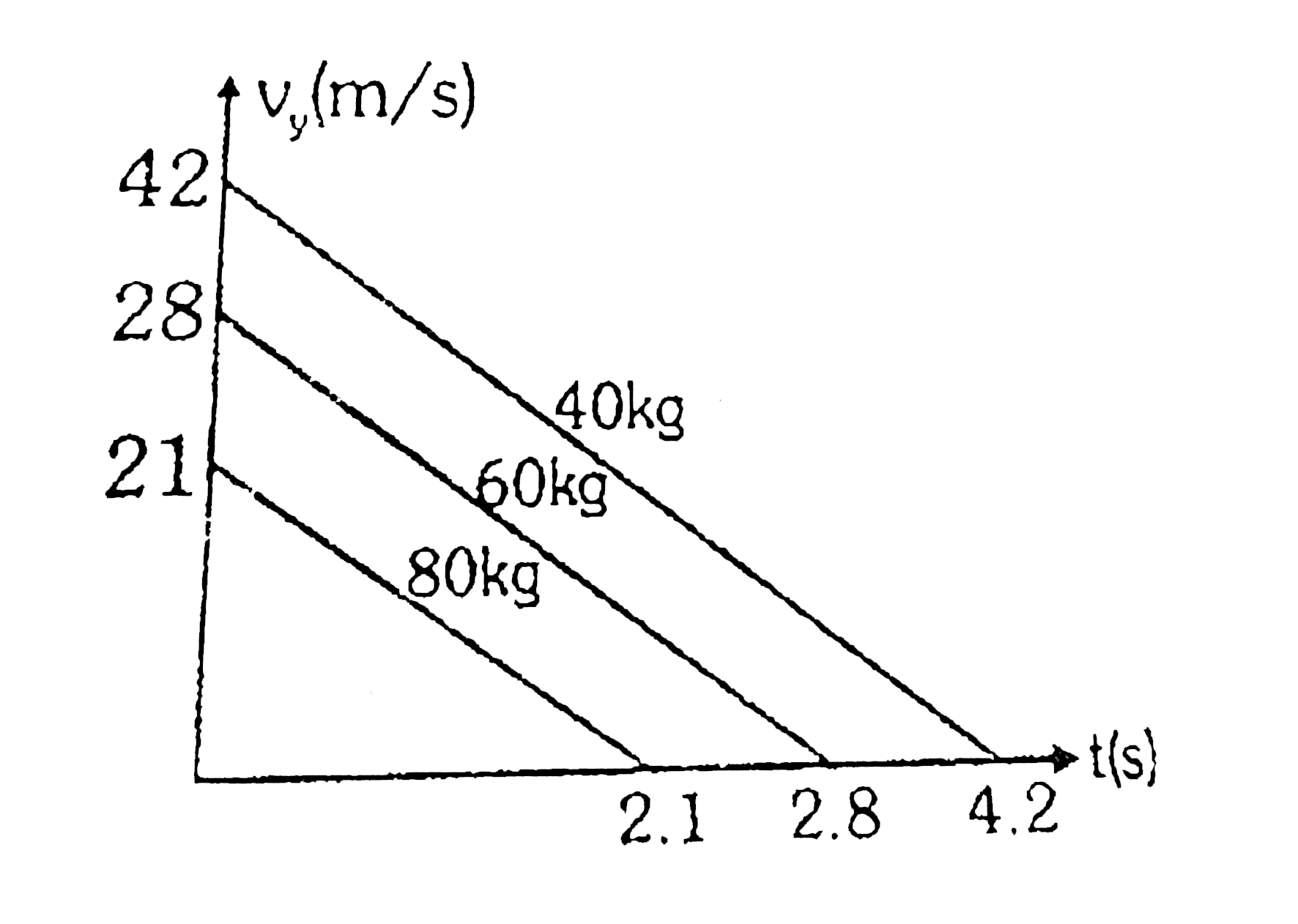
The slope of the line segments plotted in figure 2 is a figure constant. Which one of the following physical quantities does this slope represent?
View SolutionA light cylindrical tube 'T' of length l and radius 'r' containing air is inverted in water (density d). One end of the tube is open and the other is closed A block 'B' of density 2d is kept on the tube as shown in the figure. The tube stays in equilibrium in the position shown. (Assume the atmosphere pressure is to be P0)
Assume that density of air is very small than density of block and water. Pick up the correct statement (s)
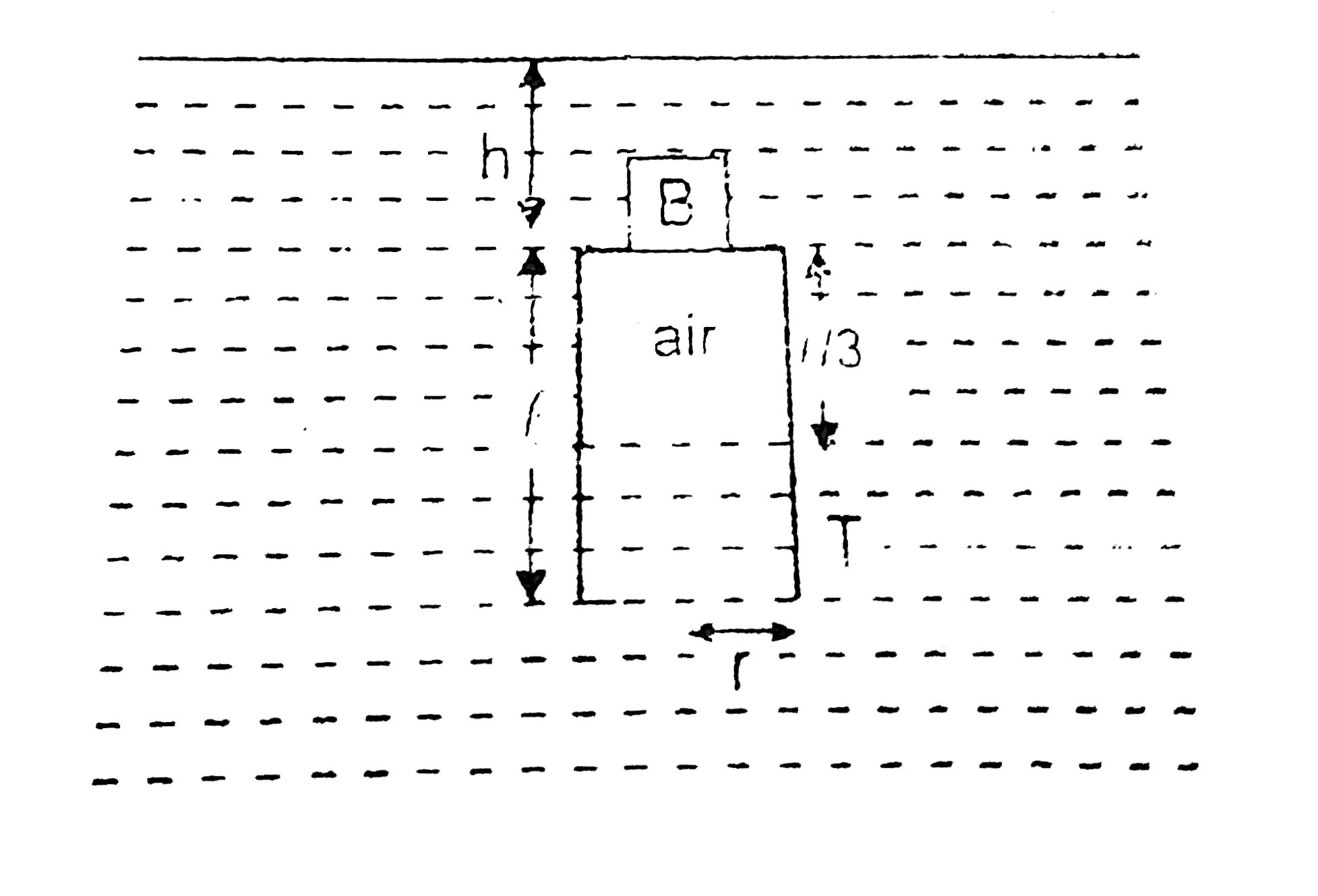
View SolutionOne end of a horizontal string is attached to a vibrating blade , and the other end passes over a pulley as in Fig. 7.49 (a). A sphere of mass 2.00kg hangs at the end of the string . The string is vibrating in its second harmonic . A container of water is raised under the sphere so that the sphere is completely submerged . In this configuration , the string vibrates in its fifth harmonic as shown in Fig . 7.49 (b). What is the radius of the sphere ?
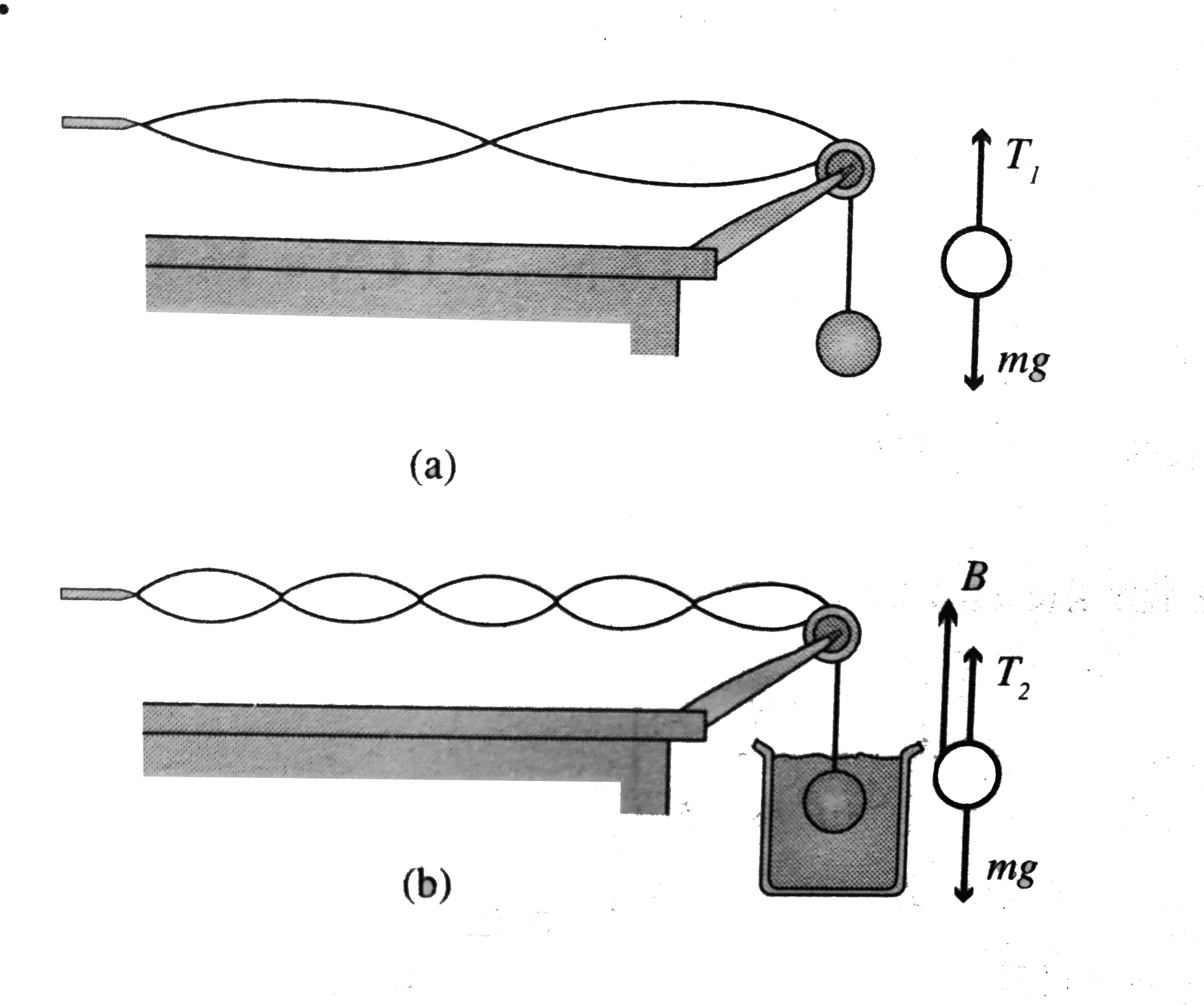
View SolutionThe experimentally determined molar mass for what type ofsubstances is always lower than the true value when water is used as solvent. Explain. Give one example of such a substance and one example of a substance which does not show a large variation from the true value.
View SolutionA glass beaker is placed partially filled with water in a sink it has a mass of 390 gm and an interior volume of 500cm2 when water starts filling the sink, it is found that if beaker is less than half full it will float but if it is more than half full it remains on the bottom of the sink as the water rises to its rim, what is the density of the material of which the beaker is made?
View SolutionA thermometer uses density of water as thermometric property. Actual reading in thermometer is height of water (h) which inversely proportional to the density of water (d). In certain temp range is symmetrical ablout maximum.
Two identical bodies (of same mass and specific heat) at different temp T1 and T2 show the same reading of height h1=h2 in the thermometer. The bodies are brought in contact and allowed to reach the equilibrium. The thermometric reading height of water for final equilibrium state hf satisfies
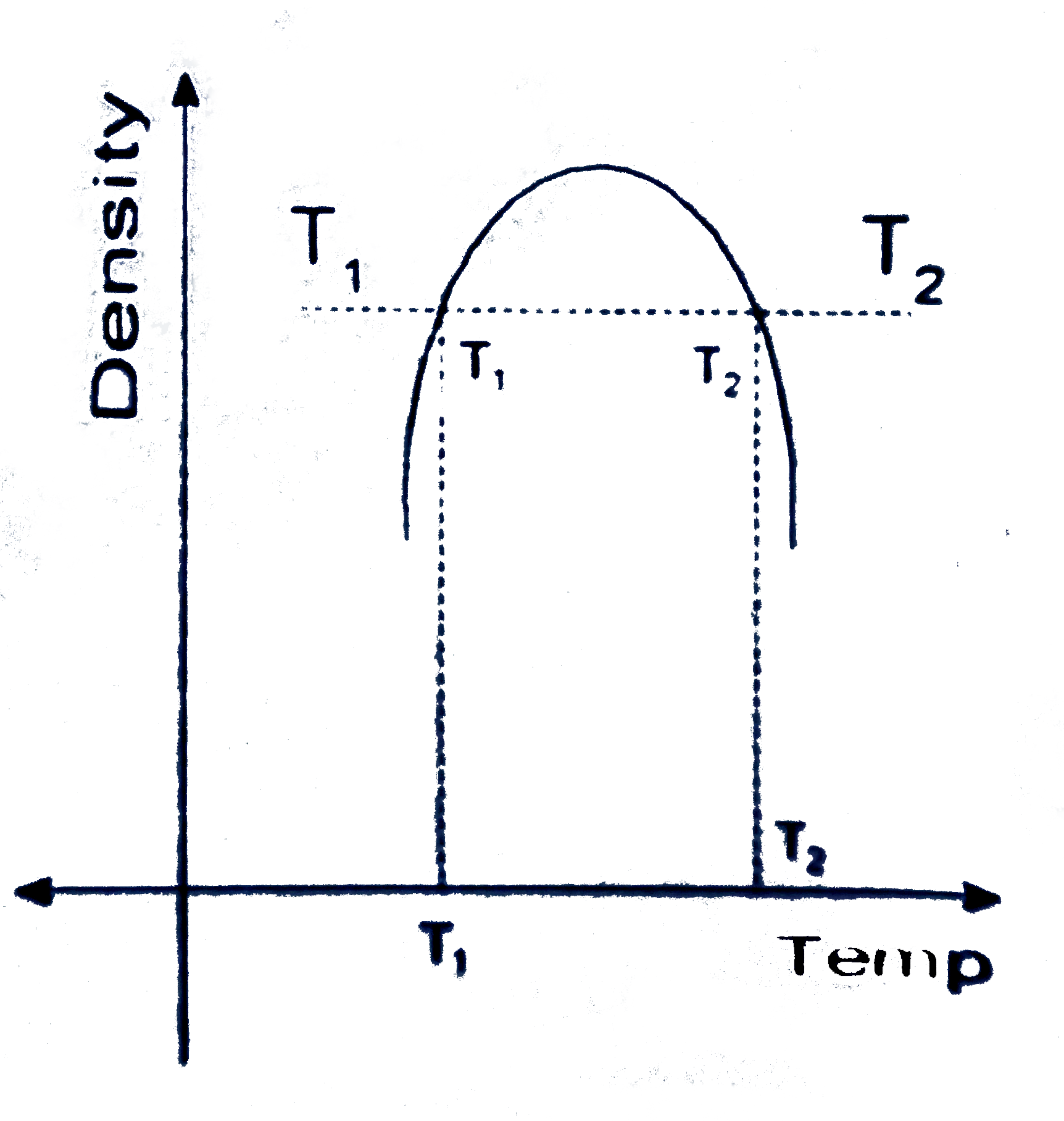
View SolutionFigure shows initial state of an ideal gas trapped in a container with conducting walls and a piston (mass m) which can move without any friction. The container is placed on point supports and its wall are conducting. Assuming that atmospheric pressure is P0 and the mass of the ideal gas is negligible as compared to the mass of the piston and the mass of container. Take the cross section area of piston to be A. The piston is slowly lifted by an external agent and held in its position. Let M be the maximum mass of container so that it may "lift off" while pulling the piston upwards and Pi be the pressure of ideal gas in initial state. Pick the correct choice:

View SolutionFigure shows as thin tube open at one end rotating with constant angular speed ω. The other end of the tube has a small opening. Tube contains a fluid of density ρ which effuses with speed u relative to the tube. Let ρA be the pressure at the point in the tube just behind the opening. Assume the atmospheric pressure to be p0 and pick correct option(s) for the instant when h=l2

View SolutionThe word fluid means a substance having particles which readily of its magnitude (a small shear stress, which may appear to be of negligible will cause deformation in the fluid). Fluids are charactrised by such properties as density. Specific weight, specific gravity, viscosity etc. Density of a substance is defined as mass per unit volume and it is denoted by. The specific gravity represents a numerical ratio of two densities, and water is commonly taken as a reference substance. Specific gravity of a substance in written as the ratio of density of substance to the density of water. Specific weight represents the force exerted by gravity on a unit volume of fluid. It is related to the density as the product of density of a fluid and acceleration due to gravity. Viscosity is the most important and is recognized as the only single property which influences the fluid motion to a great extent. The viscosity is the property by virtue of which a fluid offers resistance to deformation under the influenece if shear force. The force between the layers opposing relative motion between them are known as forces of viscosity. When a boat moves slowly on the river remains at rest. Velocities of different layers are different. Let v be the velocity of the level at a distance y from the bed and V+dv be the velocity at a distance y+dy. The velocity differs by dv in going through a distance by perpendicular to it. The quantity dvdy is called velocity gradient. The force of viscosity between two layers of a fluid is proportional to velocity gradient and Area of the layer.
F∝A & F∝dvdy
F=−ηAdvdy (−ve sign shown the force is frictional in nature and opposes relative motion. η coefficient of dynamic viscosity
Shear stress FA=−ηdvdy
and simultaneously kinematic viscosity is defined as the dynamic viscosity divided by the density. If is denoted as v. The viscosity of a fluid depends upon its intermolecular structure. In gases, the molecules are widely spaced resulting in a negligible intermolecular cohesion, while in liquids the molecules being very close to each other, the cohesion is much larger with the increases of temperature, the cohesive force decreases rapidly resulting in the decreases of viscosity. In case of gases, the viscosity is mainly due to transfer of molecular momentum in the transerve direction brought about by the molecular agitation. Molecular agitation increases with rise in temperature. Thus we conclude that viscosity of a fluid may thus be considered to be composed of two parts, first due to intermolecuar cohesion and second due to transfer of molecular momentum.
If the velocity profile is given by
v=23y−y2v is velocity in m/secy is in meter above the bad. Determine shear stress at y=0.15m, & η=0.863Ns/m2
View Solution
